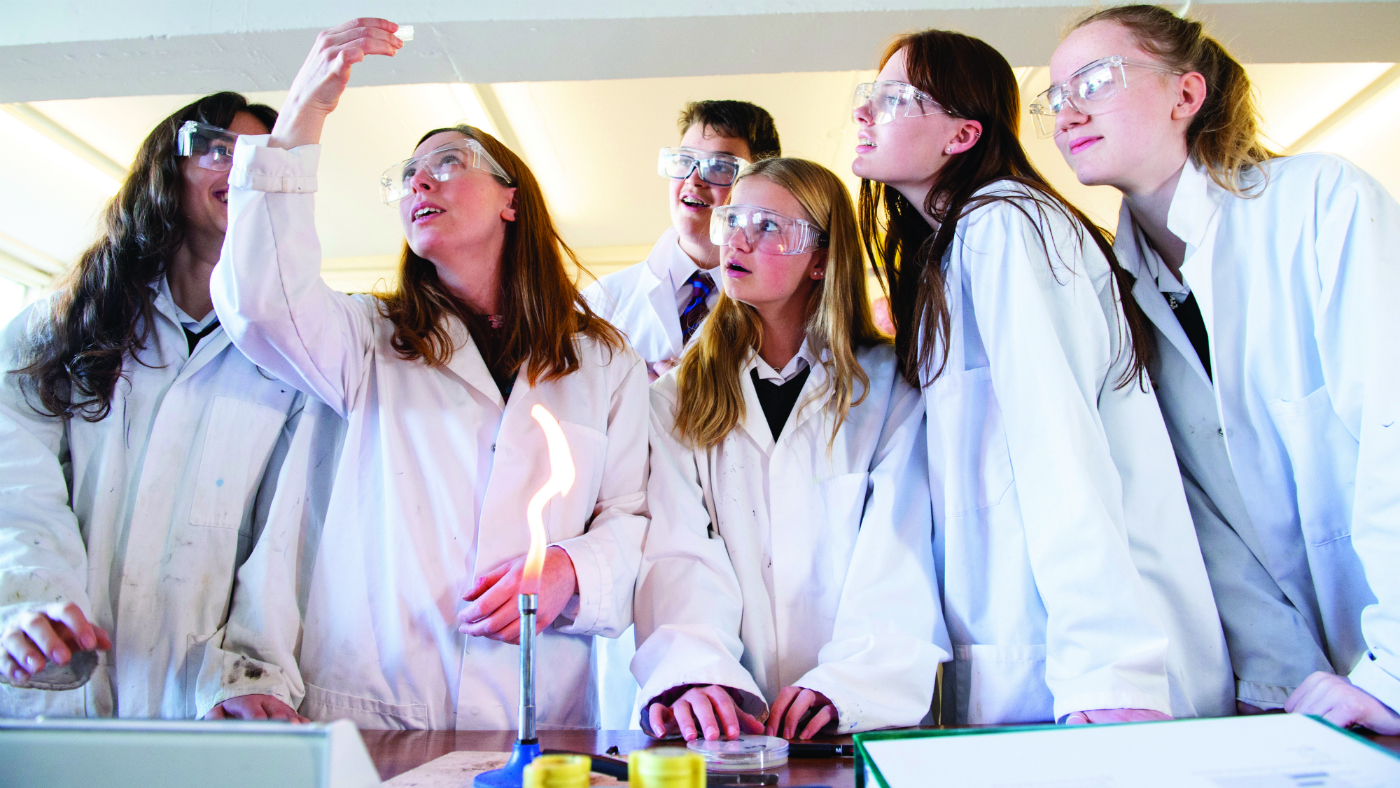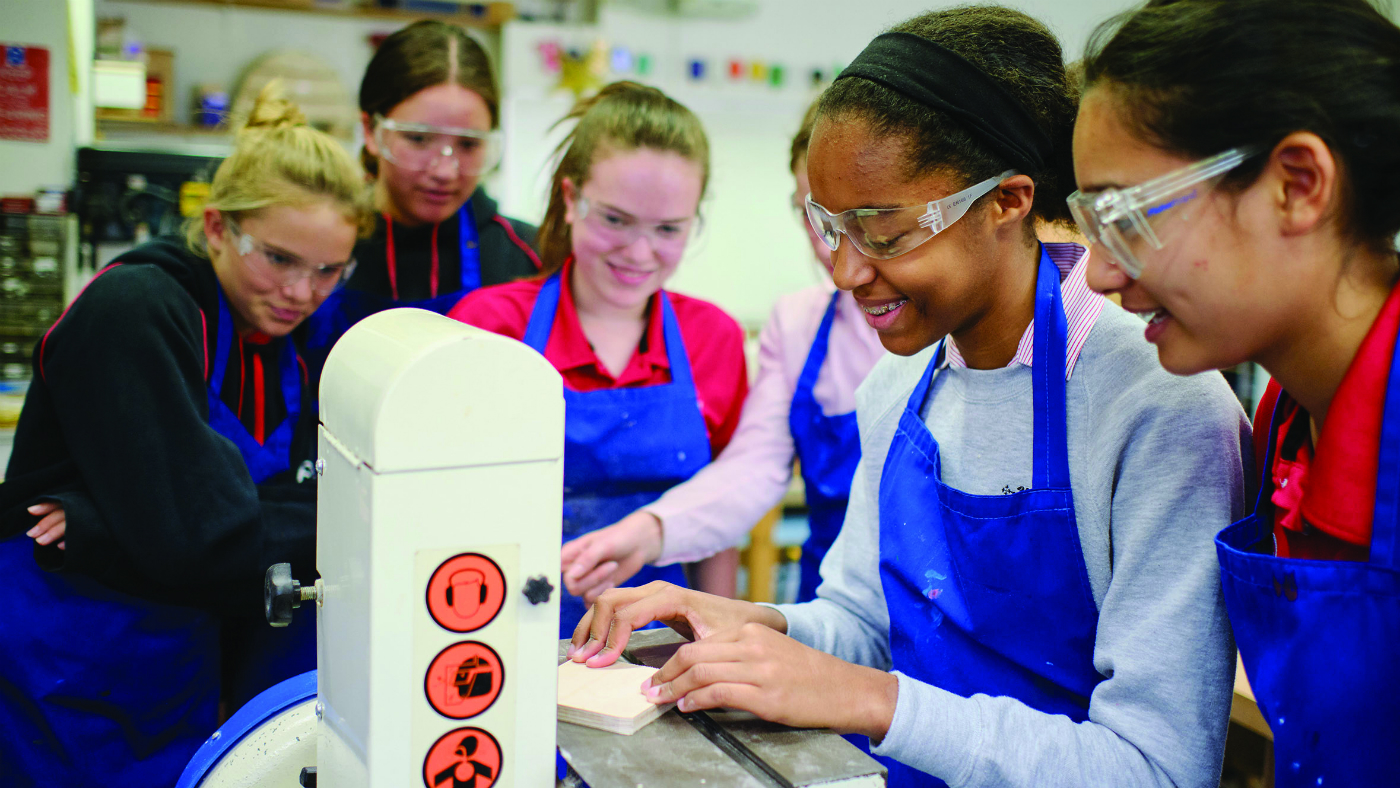Girls and STEM
The appliance of science in schools

A free daily email with the biggest news stories of the day – and the best features from TheWeek.com
You are now subscribed
Your newsletter sign-up was successful
An increasing number of girls are studying science, technology, engineering and maths at university, but men still vastly outnumber women in STEM roles in the workplace.
Emma Lee-Potter talks to teachers who are encouraging girls to pursue STEM careers.
Women represent half of the UK workforce yet only 22 per cent of people working in STEM (science, technology, engineering and maths) jobs in the UK are female and only 9 per cent of STEM apprentices are women.
The Week
Escape your echo chamber. Get the facts behind the news, plus analysis from multiple perspectives.

Sign up for The Week's Free Newsletters
From our morning news briefing to a weekly Good News Newsletter, get the best of The Week delivered directly to your inbox.
From our morning news briefing to a weekly Good News Newsletter, get the best of The Week delivered directly to your inbox.
The Week Independent Schools Guide
But things are starting to change. WISE, which campaigns for gender balance in science, technology and engineering roles, has set a goal of one million women working in core STEM jobs by 2020 and looks on track to achieve this.
As Helen Wollaston, CEO of WISE, says: “We simply have to get better at showing girls that maths, science and technology open doors to exciting, well-paid jobs where they can make a real difference to the world.”
Schools are doing their bit too, encouraging girls to study STEM subjects and showcasing the exciting opportunities in the workplace. A survey by software company Exasol in 2018 showed that the percentage of female students taking STEM subjects at A level had increased from 6.5 per cent to 11.8 per cent in the last five years.
Girls are showing their enthusiasm for STEM subjects in a host of ways.
A free daily email with the biggest news stories of the day – and the best features from TheWeek.com

Lowena Hull, a pupil at Portsmouth High School GDST, recently won £7,500 in a UK Space Agency competition for her idea to use satellites to track down lost supermarket trollies while three year 9 teams from James Allen’s Girls’ School in south London reached the final of this year’s TeenTech Awards. Their ideas included an app that helps you find your theatre or cinema seat in the dark and a new design for tampon packaging.
Delilah Hague, a sixth former from Godolphin and Latymer in west London, was part of a Teens and AI team who spoke at CogX 2019, an event that brought together the brightest minds in artificial intelligence and emerging technology. St Mary’s Calne, a girls’ school in Wiltshire, regularly runs events and activities to promote science, including physics, space, dissection and computing clubs.
It was the first independent school to be awarded the Platinum Science Mark and earlier this year former head of science Alexandra Haydon won the i25 Award for her innovative science teaching. “The lack of gender stereotypes in an all-girls’ school helps girls realise that STEM subjects are definitely for them,” says deputy head Diana Harrison, who’s also a physics teacher.
“On average a quarter of the girls go off to read STEM subjects at university – everything from civil engineering to medical microbiology.” Jo Scott, careers and enterprise leader at Thornton College, a non-selective girls’ school near Milton Keynes, takes a similar view.
“As soon as you’ve got boys in the classroom the boys want to monopolise the practicals all the time,” she says. “The fact that we’re single sex massively helps.”
Keen to highlight the breadth of STEM careers, Mrs Scott invites companies like Siemens, Aon, Robert McAlpine, KPMG and Unilever to the school’s annual STEM careers event and gets inspiring speakers, such as space scientist Flight Lieutenant Lou Page and tech entrepreneurs from Reach Robotics, to speak to pupils.
Ever pro-active, when she heard that HMGCC (Her Majesty’s Government Communications Centre) was launching a new cyber security apprenticeship she immediately invited them into school. “We need to be engaging pupils in the different STEM careers that are open to them – and then they will want to take up STEM subjects,” says Mrs Scott.
“I took the girls to an event at Oxford called the Lesser Spotted Sciences Day, where the idea was to find out about a whole load of subjects they could do that they didn’t even know existed, such as materials science.”
At Roedean, the girls’ day and boarding school near Brighton, everyone takes three separate sciences up to GCSE, almost a quarter of the sixth form do A level chemistry, more than a fifth do A level physics and two-thirds do A level maths.
More than a third of leavers read STEM subjects at university. Roedean pupils are currently involved in two major STEM projects. In one, sixth form chemists are working with University of Brighton students to develop a microfluidic device for measuring the constituents of breast milk. In the other, girls from year 10 to year 13 are building an F24 battery-run car in physics.
“There is a real challenge in the sciences – and girls like a challenge,” says Roedean head of chemistry Fiona Walker. “They also like the way that science explains the world around them.”
The school invites top women scientists to speak to pupils, including Professor Dame Carol Black, the former president of the Royal College of Physicians, and planetary scientist Suzanne Imber. A group of girls recently met Liberal Democrat MP Layla Moran, who is a physics graduate and former pupil at Roedean.
“She told them to use school as the opportunity to study the sciences because in later life you may not have the opportunity,” says Miss Walker. “You can pick up English and history later and you can go to art classes but you may never have the opportunity to work in a school laboratory again and learn the sciences in depth. It was incredibly good advice.”
Co-ed schools have seen a rise in the number of girls studying STEM subjects too. In 2017 the physics department at Latymer Upper School in west London won an Institute of Physics award for “outstanding achievement in promoting the progression of girls to A level physics”.
“Our teaching aims to stimulate and encourage each pupil to reach his or her potential, regardless of gender, and we find that girls and boys taught together flourish in subjects traditionally associated with specific genders,” says David Goodhew, head of Latymer Upper School.
“The A level choices our girls make dispel the myth that co-ed schools favour boys in these subjects. Maths, for example, is the most popular A level choice for girls at Latymer.”
The number of girls studying STEM subjects at King’s College School, Wimbledon is impressive. King’s has a co-ed sixth form and over the last five years 57 per cent of girls and 45 per cent of boys have chosen to study at least two STEM subjects at A level or the higher level IB while 75 per cent of girls and 71 per cent of boys opted for at least one STEM subject.
In 2018 24 girls out of 53 opted to study a STEM degree at university. Brighton College, which will open a new £55 million sports and science centre in 2020, engages girls in STEM subjects by inviting women scientists to speak as part of its careers programme.
It also holds a Women in Science event solely for year 11 girls. Meanwhile girls at co-ed Epsom College have had notable STEM successes. An all-girls team recently came third in this year’s International Youth Rocketry Challenge.
As Chris Telfer-Mason, head of physics, explains: “We have removed stereotyping by promoting STEM to both genders and encouraging students to work together in mixed teams, with job roles allocated based on an individual’s ability and skill.”
-
 The pros and cons of banning cellphones in classrooms
The pros and cons of banning cellphones in classroomsPros and cons The devices could be major distractions
-
 School phone bans: Why they're spreading
School phone bans: Why they're spreadingFeature 17 states are imposing all-day phone bans in schools
-
 Schools: The return of a dreaded fitness test
Schools: The return of a dreaded fitness testFeature Donald Trump is bringing the Presidential Fitness Test back to classrooms nationwide
-
 Send reforms: government's battle over special educational needs
Send reforms: government's battle over special educational needsThe Explainer Current system in 'crisis' but parents fear overhaul will leave many young people behind
-
 Education: Can public schools be religious?
Education: Can public schools be religious?Feature A Supreme Court seems ready to rule in favor of religious charter schools in Oklahoma, which could reshape public education
-
 America's academic brain drain has begun
America's academic brain drain has begunIN THE SPOTLIGHT As the Trump administration targets universities and teachers, educators are eying greener academic pastures elsewhere — and other nations are starting to take notice
-
 Schools' Send crisis: how can it be fixed?
Schools' Send crisis: how can it be fixed?Today's Big Question Government urged to reform support for children with special educational needs and disabilities and save councils from bankruptcy
-
 Unschooling: the radical education trend raising eyebrows
Unschooling: the radical education trend raising eyebrowsUnder the radar Some parents are letting their children lead their education


